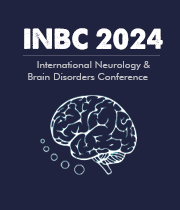Yasmine Elsherif, American Hospital Dubai, United Arab Emirates
Background: Melanocytes, responsible for melanin production, originate from the neural crest and can give rise to malignant tumors known as melanoma. Primary Central Nervous System Melanoma (pCNSM) is a rare occurrence, with an incidence of 0.005 cases per 100,000 individuals ann [....] » Read More


































Title : Neural nanomedicine: Fighting stroke, improving stem cell delivery, healing nerves and using artificial intelligence
Thomas J Webster, Interstellar Therapeutics, United States
Nanomedicine is the use of nanomaterials to improve disease prevention, detection, and treatment which has resulted in hundreds of FDA approved medical products. While nanomedicine has been around for several decades, new technological advances are pushing its boundaries. For exa [....] » Read More
Title : Human understanding and machine intelligence: A systems neuroscience perspective
Yan M Yufik, Virtual Structures Research, Inc, United States
Aristotle’s “Metaphysics” starts with a pronouncement “Humans desire to understand”, establishing understanding capacity as the defining characteristic of human intellect separating humans from the other species. Throughout history, cognitive capacit [....] » Read More
Title : 3DYNAFS-MBAFUS: A virtual lab of microbubble-amplified focused ultrasound for noninvasive treatments of neurodisorders
Jingsen Ma, Dynaflow, Inc, United States
Focused Ultrasound (FUS), especially when amplified by Microbubbles (MB), offers non-invasive options for treating deep-seated and brain tumors and other neurodisorders, by enabling targeted surgical ablation and/or local blood-brain-barrier opening (BBBO) for effective drug deli [....] » Read More
Title : Cannabis/CBD for treating neurological disorders
Jag H Khalsa, GWU School of Medicine and Health Sciences, United States
Cannabis is the most used illegal drug in the world with an estimated 2.5% of the world’s population (180 million) using it regularly (World Drug Report 2017)1. Medicinal and/or recreational cannabis use is associated with significant health consequences) (WHO, 20162; Volko [....] » Read More
Title : miR-590-3p delivery via nanoparticle technology inhibits recurrent GBM tumor growth by targeting multiple oncogenic nodes downstream of TGFBR2
Sophie Sall, Kennedy Krieger Institute, United States
Glioblastoma (GBM) is the most common central nervous system cancer diagnosed in adults. Heterogeneous and aggressive in nature, GBM is often found to resist standard of care (SOC) treatment and is almost guaranteed to recur. Upon recurrence, treatment options are very limited an [....] » Read More
Title : Neurochemical and behavioral effects of olanzapine in a high-risk schizophrenia mouse model
Sindhu Sriramoji Virdi, Rutgers University New Jersey Medical School, United States
Schizophrenia is a mental disorder affecting behavior, cognition, and emotion. While schizophrenia is characterized by the dysregulation of dopamine in the brain, specifically the striatum, its physiology is undetermined. Olanzapine, an atypical antipsychotic, is commonly prescri [....] » Read More
Title : Challenges in translating science into medicine in the field of brain health
Younok Dumortier Shin, ALAIRED LLC, United States
From dementia to depression to pain, neurological diseases affect almost everyone at some point in our lives. The medical research has advanced tremendously, thanks to the advanced technologies such as high-resolution imaging systems, genetic diagnostic tools, and high-throughput [....] » Read More
Title : Serum levels of ferritin, iron and TIBC in cerebral venous sinus thrombosis
Nazanin Azizi, University of California Davis, United States
Background: Cerebral venous sinus thrombosis (CVST) is a potentially life-threatening condition with a wide range of clinical presentations from localized headache (the most common symptom) to mental status disturbances, seizure and coma. The main purpose of this study is to eval [....] » Read More
Title : Application of AI and computational approaches supporting new generation healthcare aiming at prevention with focus on gender differences
Erwin L J Roggen, ToxGenSolutions BV, Netherlands
ToxGenSolutions is a biotech company focused on developing novel and innovative methods to drive the discovery of impactful and personalized early-stage diagnostics and therapeutics with focus on prevention of chronic disease (Alzheimer’s disease, pain syndromes and long-CO [....] » Read More
Title : Relationships between sensory patterns, executive functions, and decreased time organization abilities among adults with specific learning disabilities
Kineret Sharfi, Ben-Gurion University, Israel
The literature describes a close relationship between cognitive executive functions and daily activity. Adults with specific learning disabilities (SLDs) (e.g., dyslexia, dysgraphia, and dyscalculia) reveal limitations in daily activity in various life domains including decreased [....] » Read More
Title : Necrobotics 360: Shaping the future of healthcare
Raul V Rodriguez, Woxsen University, India
Necrobotics 360: Shaping the Future of Healthcare" presents a transformative vision where cutting-edge artificial intelligence (AI) technologies converge with healthcare, redefining the future of medical practices. It is an innovative approach that integrates AI, machine lea [....] » Read More
Title : The role of the circadian rhythm in alzheimer's disease and aging
Mohamad Sultan Khan, University of Hyderabad, India
During the course of evolution and earth’s rotation round its axis, the surface inhabitants are exposed to daily a predictable light and dark condition which impose specific demands on the physiology and influences the behaviour of an organism. Such cyclic patterns in the p [....] » Read More
Title : A collaborative innovation in developing the novel Head And Trunk Control Rehabilitation (HATCoRe) device for children with cerebral palsy: Revolutionizing pediatric rehabilitation
Shristi Shakya, Manipal College of Health Professions, India
Background and objectives: A delay in achieving head and trunk control can present numerous challenges in the activities of daily living for children with Cerebral Palsy (CP). This frequently require extended therapy, which may become repetitive, leading to decreased engagement i [....] » Read More
Title : Biomarkers in alzheimer´s disease – New perspectives
Gustavo Alves A dos Santos, Sao Leopoldo Mandic Araras, Brazil
The development of an early and assertive diagnosis of Alzheimer’s Dementia can contribute to a better quality of life for patients, mainly by providing targeted therapy with measurable results. Biomarkers can be detected in blood levels and, more recently, the feasibility [....] » Read More
Title : Developing an online task to examine how attention to detail affects learning dynamics
Mary Avella, Hunter College, United States
Autism Spectrum Disorder is a neurological disorder that affects how a person communicates and interacts with others. One way people on the spectrum are different from neurotypical people is in their attentional focus. In particular, those on the spectrum have been shown to pay c [....] » Read More
Title : Projective testing as windows to the mind: Unveiling anxiety's expression through artistic mediums in teenagers
Aryan Shah, William P. Clements High School, United States
Nearly one in three of all Americans aged 13 to 18 experience an anxiety disorder. It is important now to accurately diagnose anxiety in adolescents. Current methods of diagnosis involve psychological evaluations and questionnaires. However, unconscious bias and stereotypes can i [....] » Read More
Title : Projective testing as windows to the mind: Unveiling anxiety's expression through artistic mediums in teenagers
Rhea Ahuja, William P. Clements High School, United States
Nearly one in three of all Americans aged 13 to 18 experience an anxiety disorder. It is important now to accurately diagnose anxiety in adolescents. Current methods of diagnosis involve psychological evaluations and questionnaires. However, unconscious bias and stereotypes can i [....] » Read More
Title : A case of normal pressure hydrocephalus in an elderly male
Michael Sulaiman, Edward Via College of Osteopathic Medicine, United States
Normal pressure hydrocephalus is a rare neurologic disorder primarily impacting older adults, classically presenting with clinical triad of gait dysfunction, cognitive impairment, and urinary incontinence, in addition to hydrocephalus on brain imaging. Normal pressure hydrocephal [....] » Read More
Title : Traumatic iatrogenic posterior interosseus nerve axonotmesis due to peripheral intravenous insertion: A case report
Dominique Smith, Loma Linda University Education & Health Consortium, United States
We present a case of a 43-year-old patient with a past medical history of intravenous drug abuse who presented with one month of numbness, pain, and paresthesia localized to the left posterior forearm and dorsum of hand. The patient also endorsed subjective weakness affecting gri [....] » Read More
Title : Decoding complexity: Readability analysis of public online health information on common neurological diagnoses
Puja Punukollu, Augusta University, United States
Neurological disorders, comprising conditions like dementia, migraines, and stroke, pose significant health challenges globally. In the digital age, individuals increasingly turn to online platforms for health information. Given the intricate nature of neurological conditions, ev [....] » Read More
Title : Evaluate the efficacy of AXL inhibitor bemcentinib in the rNLS8 mouse model of amyotrophic lateral sclerosis
Guyin Chen, University of Pennsylvania, United States
Aim and Methods: We aim to evaluate if the pharmacological inhibition of the myeloid/microglial receptor tyrosine kinase AXL could be used as a novel therapeutic approach for Amyotrophic Lateral Sclerosis (ALS). The objective of the present research is to evaluate the efficacy of [....] » Read More
Title : Effect of lower extremity proprioceptive neuromuscular facilitation on stair ambulation in persons with stroke: A pre-post study
Rikesh Shrestha, Sentara Health, United States
Background and objectives: Persons with stroke often encounter challenges in ambulation due to impaired motor function and coordination. The aftermath of stroke can significantly affect a person’s ability to ambulate independently, necessitating tailored intervention for re [....] » Read More
Title : Caspase inhibition: A trailblazer armament to treat neurodegenerative disorders
Amaan Javed, University College of Medical Sciences, India
Introduction: Apoptosis is a form of programmed cell death, that underlies the wide range of symptoms investigated in neurological disorders from stroke to neurodegenerative diseases such as Alzheimer’s. Caspases are shown to be capable of producing inflammasomes along [....] » Read More
Title : Clinical profile of cerebral venous thrombosis
Naranchimeg Gendendagva, The Third State Central Hospital of Mongolia, Mongolia
Cerebral venous thrombosis is a rare neurological disorder that can be diagnosed clinically and neuro-radiologically. The prognosis of this disease is good in most cases. However, if it is complicated by a stroke, it can lead to death or disability. Cerebral vein thrombosis accou [....] » Read More